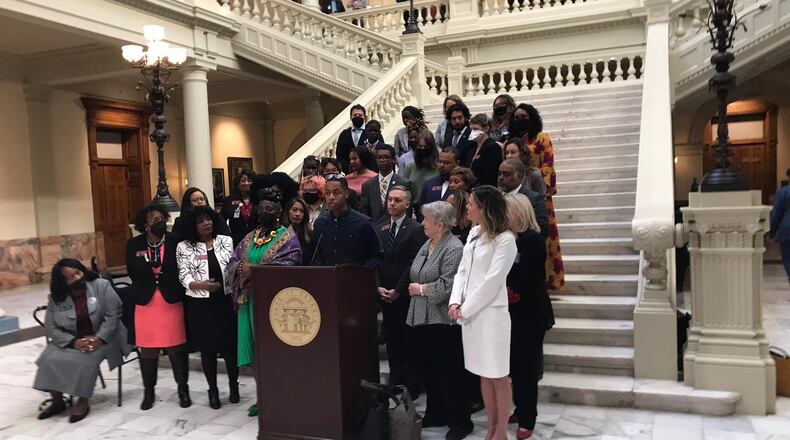Do the Georgia parents storming school board meetings to denounce what kids learn in school ever wonder what students are learning from them and their actions?
Parents come to the podium with a young adult novel, flip to the one page that contains a sex scene and start reading it aloud. They often roll their eyes or guffaw when students themselves defend the books, suggesting that while they want to protect kids, they don’t want to hear their views.
Forsyth County high school senior Anvita Sachdeva has witnessed scenes that grew so hostile that police moved rowdy audiences to the hallway and speakers addressed school board members in any empty chamber one-by-one.
I asked Sachdeva and other students who’ve attended school board meetings and hearings what they would like to tell those adults pushing for books to be yanked from school libraries.
“I would ask them not even to change their viewpoint, but to keep an open mind. Even though I didn’t agree with what the parents were saying, I still listened. They refused to listen. Whenever someone would speak against book bans, they would start yelling,” said Sachdeva. “I also wish they were more informed. They were taking so many things out of context.”
Ellie Nease, a senior from Savannah, said parents in her community may be glancing over a child’s shoulder at a single passage in a book or accepting the critiques of other parents. She urged them to read the books themselves.
Even Shakespeare addressed sex, sexual violence and abuse in his writings although in less direct language, Nease noted. “These issues are real and it doesn’t help to hide students away from them until they are legal adults,” she said. “In schools, children may be able to talk about some of these things with a peer, a teacher or maybe even their parents.”
Parents reading passages aloud from a popular young adult novel where teen boys use graphic terms to discuss sex don’t realize this isn’t shocking to high school students, according to Sachdeva. “It is reality. Especially in high school, boys do talk about girls as if they were objects. My parents were raised in a different country, and my mother asked me, ‘Do boys here really speak like that?’ Yup, they do.”
A Savannah high school sophomore, Harrison Tran said many condemned books feature people of color or LGBTQ characters. “There is nothing inappropriate about being queer, Black or a person of color in the Georgia and United States,” said Tran.
Tran wants protesting parents to recognize that the world has changed from when they were students. “Parents, of course, always want the best interest of their child, but sometimes it leads them to extremes like book bans,” said Tran. “Many of these parents who are white seem to be afraid of diversity and students learning from perspectives that aren’t their own.”
“The work of groups organizing and advocating to ban books in schools is especially harmful to students from historically marginalized backgrounds, who are forced to experience stories that validate their lives vanishing from classrooms and library shelves,” said Jonathan Friedman, director of PEN America’s Free Expression and Education Programs and the lead author of a new report on the rapid acceleration of book censorship nationwide.
The Georgia Legislature passed Senate Bill 226, which expedites the removal of books deemed “harmful to minors” and requires principals to review and decide whether to remove contested works within seven business days. Gov. Brian Kemp signed the bill over the objections of school librarians who countered an effective review process was already in place for challenged books.
Tran and Nease were among the Savannah teens who traveled to the Gold Dome in the spring to address the Senate Education and Youth Committee over legislation to ban the teaching of divisive concepts. They signed up, prepared their testimony and arrived six hours early, but the committee chair didn’t allow them to comment, citing a time crunch.
A third-year student at Georgia Tech, Alex Ames helps other young people navigate the political process through the Georgia Youth Justice Coalition. “I have not felt students have been heard or encouraged to speak out,” she said. “If politicians feel they can write policy without hearing from people actually in the schools, it’s a lot easier to justify bad policy decisions.”
As more Georgia students organize and find allies in teachers and parents, Ames said they become more willing to speak at a school board meeting or a legislative hearing. And she said students are realizing, “They wouldn’t try to silence us if we weren’t powerful.”
About the Author
The Latest
Featured



